Comprehensive Report: Early Intervention in Mental Health Care
VerifiedAdded on 2022/12/23
|11
|3215
|22
Report
AI Summary
This report focuses on early intervention strategies in mental health, emphasizing the importance of timely care for individuals experiencing early symptoms of distress or illness. It explores the Australian government's national health priority on emotional wellness and psychological sickness, which often emerges in youth and early adulthood. The report outlines the benefits of early intervention, such as less intense treatment, reduced suicidal tendencies, and increased self-esteem. It includes a literature review, evidence-based nursing interventions, and a critical review of the approaches. The report also highlights the significance of community awareness and the need for comprehensive interventions, including counseling and social activities. The conclusion stresses the importance of promoting mental health and well-being in Australia through preventative measures and supportive interventions.
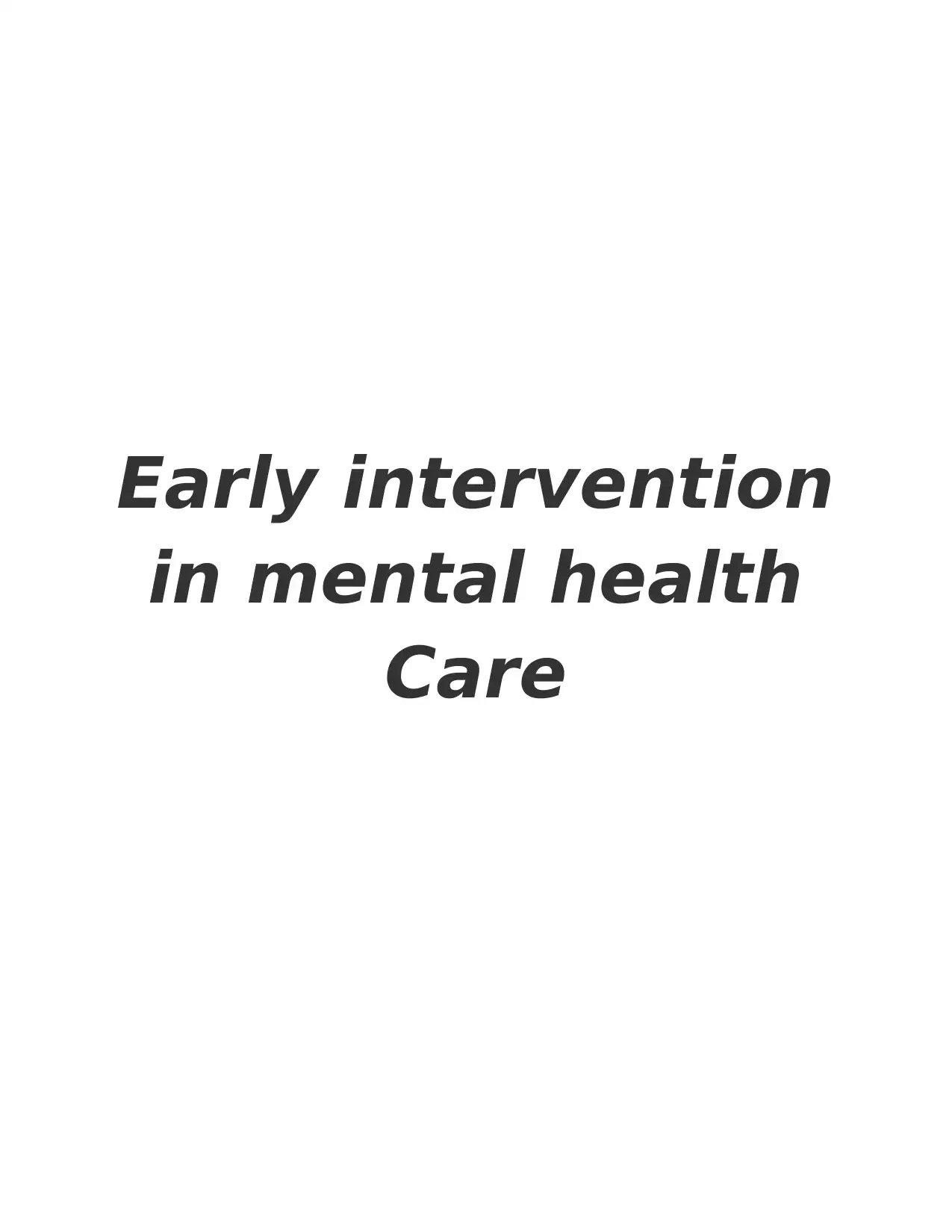
Early intervention
in mental health
Care
in mental health
Care
Paraphrase This Document
Need a fresh take? Get an instant paraphrase of this document with our AI Paraphraser
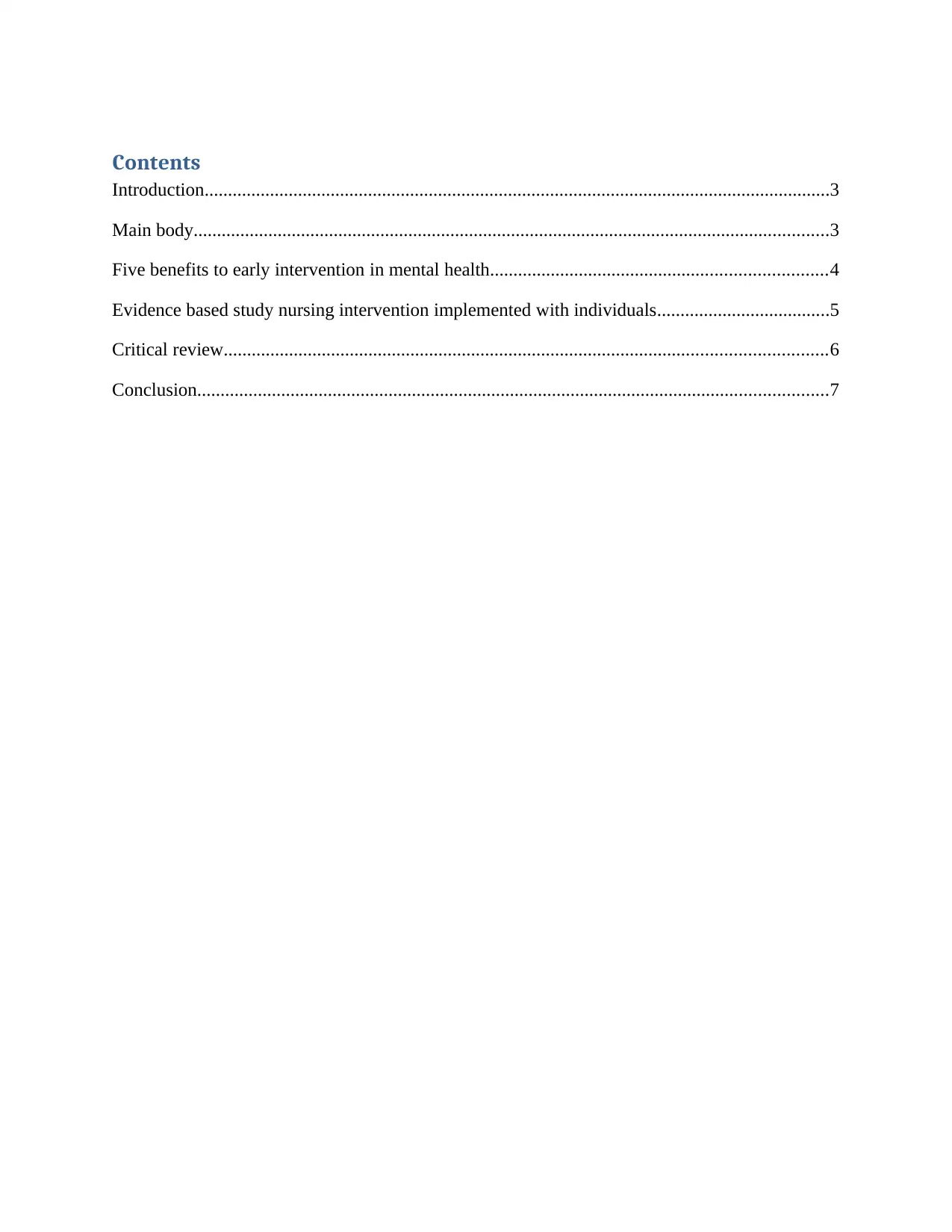
Contents
Introduction......................................................................................................................................3
Main body........................................................................................................................................3
Five benefits to early intervention in mental health........................................................................4
Evidence based study nursing intervention implemented with individuals.....................................5
Critical review.................................................................................................................................6
Conclusion.......................................................................................................................................7
Introduction......................................................................................................................................3
Main body........................................................................................................................................3
Five benefits to early intervention in mental health........................................................................4
Evidence based study nursing intervention implemented with individuals.....................................5
Critical review.................................................................................................................................6
Conclusion.......................................................................................................................................7
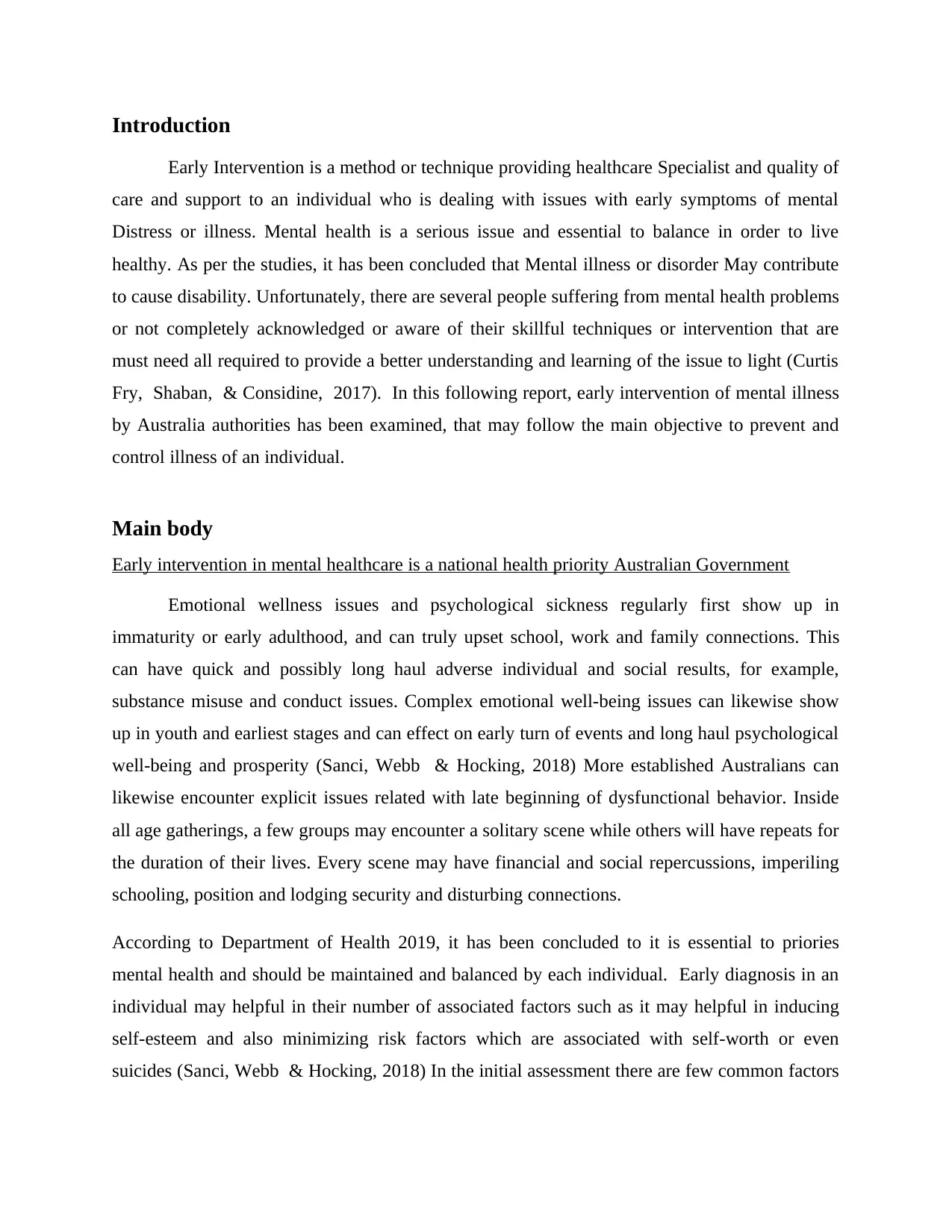
Introduction
Early Intervention is a method or technique providing healthcare Specialist and quality of
care and support to an individual who is dealing with issues with early symptoms of mental
Distress or illness. Mental health is a serious issue and essential to balance in order to live
healthy. As per the studies, it has been concluded that Mental illness or disorder May contribute
to cause disability. Unfortunately, there are several people suffering from mental health problems
or not completely acknowledged or aware of their skillful techniques or intervention that are
must need all required to provide a better understanding and learning of the issue to light (Curtis
Fry, Shaban, & Considine, 2017). In this following report, early intervention of mental illness
by Australia authorities has been examined, that may follow the main objective to prevent and
control illness of an individual.
Main body
Early intervention in mental healthcare is a national health priority Australian Government
Emotional wellness issues and psychological sickness regularly first show up in
immaturity or early adulthood, and can truly upset school, work and family connections. This
can have quick and possibly long haul adverse individual and social results, for example,
substance misuse and conduct issues. Complex emotional well-being issues can likewise show
up in youth and earliest stages and can effect on early turn of events and long haul psychological
well-being and prosperity (Sanci, Webb & Hocking, 2018) More established Australians can
likewise encounter explicit issues related with late beginning of dysfunctional behavior. Inside
all age gatherings, a few groups may encounter a solitary scene while others will have repeats for
the duration of their lives. Every scene may have financial and social repercussions, imperiling
schooling, position and lodging security and disturbing connections.
According to Department of Health 2019, it has been concluded to it is essential to priories
mental health and should be maintained and balanced by each individual. Early diagnosis in an
individual may helpful in their number of associated factors such as it may helpful in inducing
self-esteem and also minimizing risk factors which are associated with self-worth or even
suicides (Sanci, Webb & Hocking, 2018) In the initial assessment there are few common factors
Early Intervention is a method or technique providing healthcare Specialist and quality of
care and support to an individual who is dealing with issues with early symptoms of mental
Distress or illness. Mental health is a serious issue and essential to balance in order to live
healthy. As per the studies, it has been concluded that Mental illness or disorder May contribute
to cause disability. Unfortunately, there are several people suffering from mental health problems
or not completely acknowledged or aware of their skillful techniques or intervention that are
must need all required to provide a better understanding and learning of the issue to light (Curtis
Fry, Shaban, & Considine, 2017). In this following report, early intervention of mental illness
by Australia authorities has been examined, that may follow the main objective to prevent and
control illness of an individual.
Main body
Early intervention in mental healthcare is a national health priority Australian Government
Emotional wellness issues and psychological sickness regularly first show up in
immaturity or early adulthood, and can truly upset school, work and family connections. This
can have quick and possibly long haul adverse individual and social results, for example,
substance misuse and conduct issues. Complex emotional well-being issues can likewise show
up in youth and earliest stages and can effect on early turn of events and long haul psychological
well-being and prosperity (Sanci, Webb & Hocking, 2018) More established Australians can
likewise encounter explicit issues related with late beginning of dysfunctional behavior. Inside
all age gatherings, a few groups may encounter a solitary scene while others will have repeats for
the duration of their lives. Every scene may have financial and social repercussions, imperiling
schooling, position and lodging security and disturbing connections.
According to Department of Health 2019, it has been concluded to it is essential to priories
mental health and should be maintained and balanced by each individual. Early diagnosis in an
individual may helpful in their number of associated factors such as it may helpful in inducing
self-esteem and also minimizing risk factors which are associated with self-worth or even
suicides (Sanci, Webb & Hocking, 2018) In the initial assessment there are few common factors
⊘ This is a preview!⊘
Do you want full access?
Subscribe today to unlock all pages.

Trusted by 1+ million students worldwide
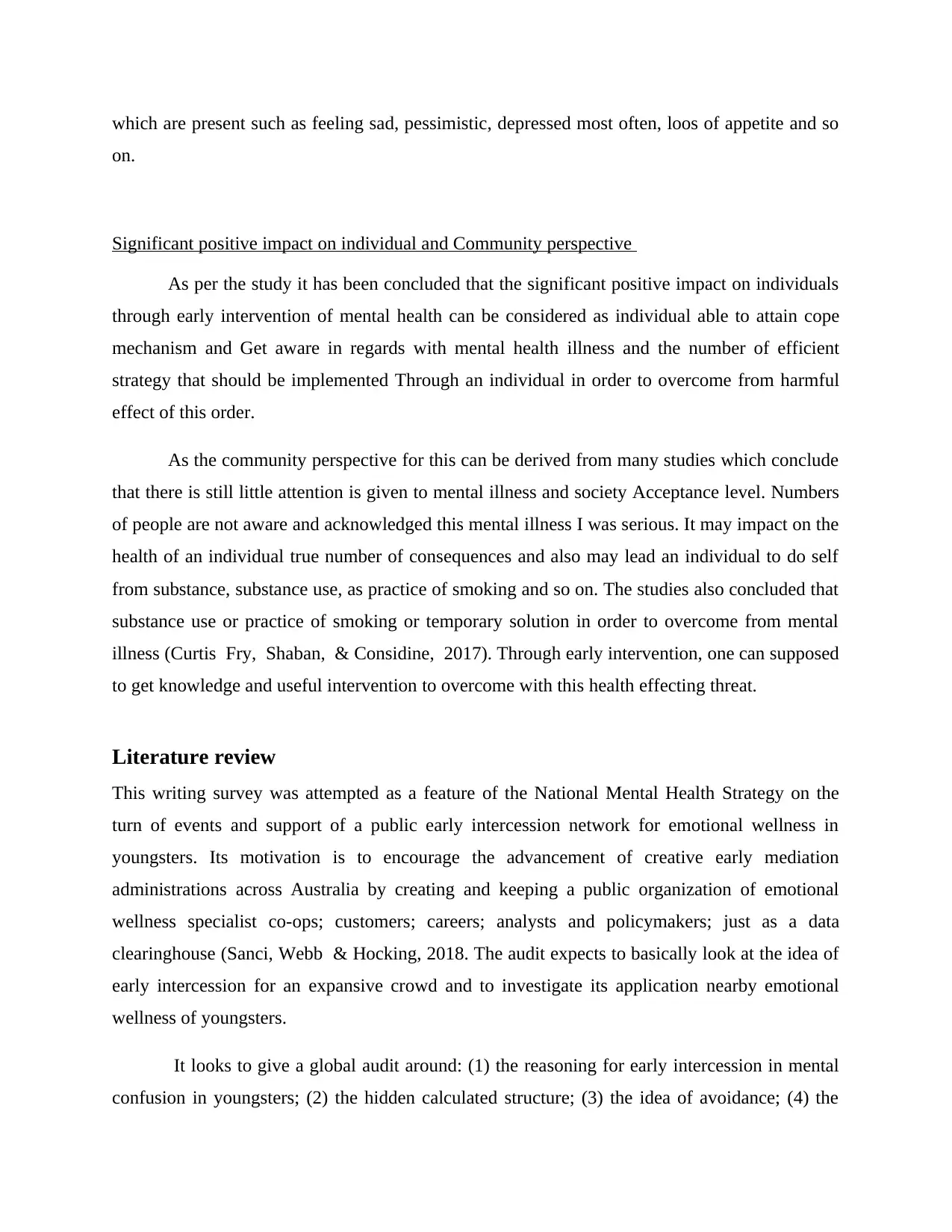
which are present such as feeling sad, pessimistic, depressed most often, loos of appetite and so
on.
Significant positive impact on individual and Community perspective
As per the study it has been concluded that the significant positive impact on individuals
through early intervention of mental health can be considered as individual able to attain cope
mechanism and Get aware in regards with mental health illness and the number of efficient
strategy that should be implemented Through an individual in order to overcome from harmful
effect of this order.
As the community perspective for this can be derived from many studies which conclude
that there is still little attention is given to mental illness and society Acceptance level. Numbers
of people are not aware and acknowledged this mental illness I was serious. It may impact on the
health of an individual true number of consequences and also may lead an individual to do self
from substance, substance use, as practice of smoking and so on. The studies also concluded that
substance use or practice of smoking or temporary solution in order to overcome from mental
illness (Curtis Fry, Shaban, & Considine, 2017). Through early intervention, one can supposed
to get knowledge and useful intervention to overcome with this health effecting threat.
Literature review
This writing survey was attempted as a feature of the National Mental Health Strategy on the
turn of events and support of a public early intercession network for emotional wellness in
youngsters. Its motivation is to encourage the advancement of creative early mediation
administrations across Australia by creating and keeping a public organization of emotional
wellness specialist co-ops; customers; careers; analysts and policymakers; just as a data
clearinghouse (Sanci, Webb & Hocking, 2018. The audit expects to basically look at the idea of
early intercession for an expansive crowd and to investigate its application nearby emotional
wellness of youngsters.
It looks to give a global audit around: (1) the reasoning for early intercession in mental
confusion in youngsters; (2) the hidden calculated structure; (3) the idea of avoidance; (4) the
on.
Significant positive impact on individual and Community perspective
As per the study it has been concluded that the significant positive impact on individuals
through early intervention of mental health can be considered as individual able to attain cope
mechanism and Get aware in regards with mental health illness and the number of efficient
strategy that should be implemented Through an individual in order to overcome from harmful
effect of this order.
As the community perspective for this can be derived from many studies which conclude
that there is still little attention is given to mental illness and society Acceptance level. Numbers
of people are not aware and acknowledged this mental illness I was serious. It may impact on the
health of an individual true number of consequences and also may lead an individual to do self
from substance, substance use, as practice of smoking and so on. The studies also concluded that
substance use or practice of smoking or temporary solution in order to overcome from mental
illness (Curtis Fry, Shaban, & Considine, 2017). Through early intervention, one can supposed
to get knowledge and useful intervention to overcome with this health effecting threat.
Literature review
This writing survey was attempted as a feature of the National Mental Health Strategy on the
turn of events and support of a public early intercession network for emotional wellness in
youngsters. Its motivation is to encourage the advancement of creative early mediation
administrations across Australia by creating and keeping a public organization of emotional
wellness specialist co-ops; customers; careers; analysts and policymakers; just as a data
clearinghouse (Sanci, Webb & Hocking, 2018. The audit expects to basically look at the idea of
early intercession for an expansive crowd and to investigate its application nearby emotional
wellness of youngsters.
It looks to give a global audit around: (1) the reasoning for early intercession in mental
confusion in youngsters; (2) the hidden calculated structure; (3) the idea of avoidance; (4) the
Paraphrase This Document
Need a fresh take? Get an instant paraphrase of this document with our AI Paraphraser
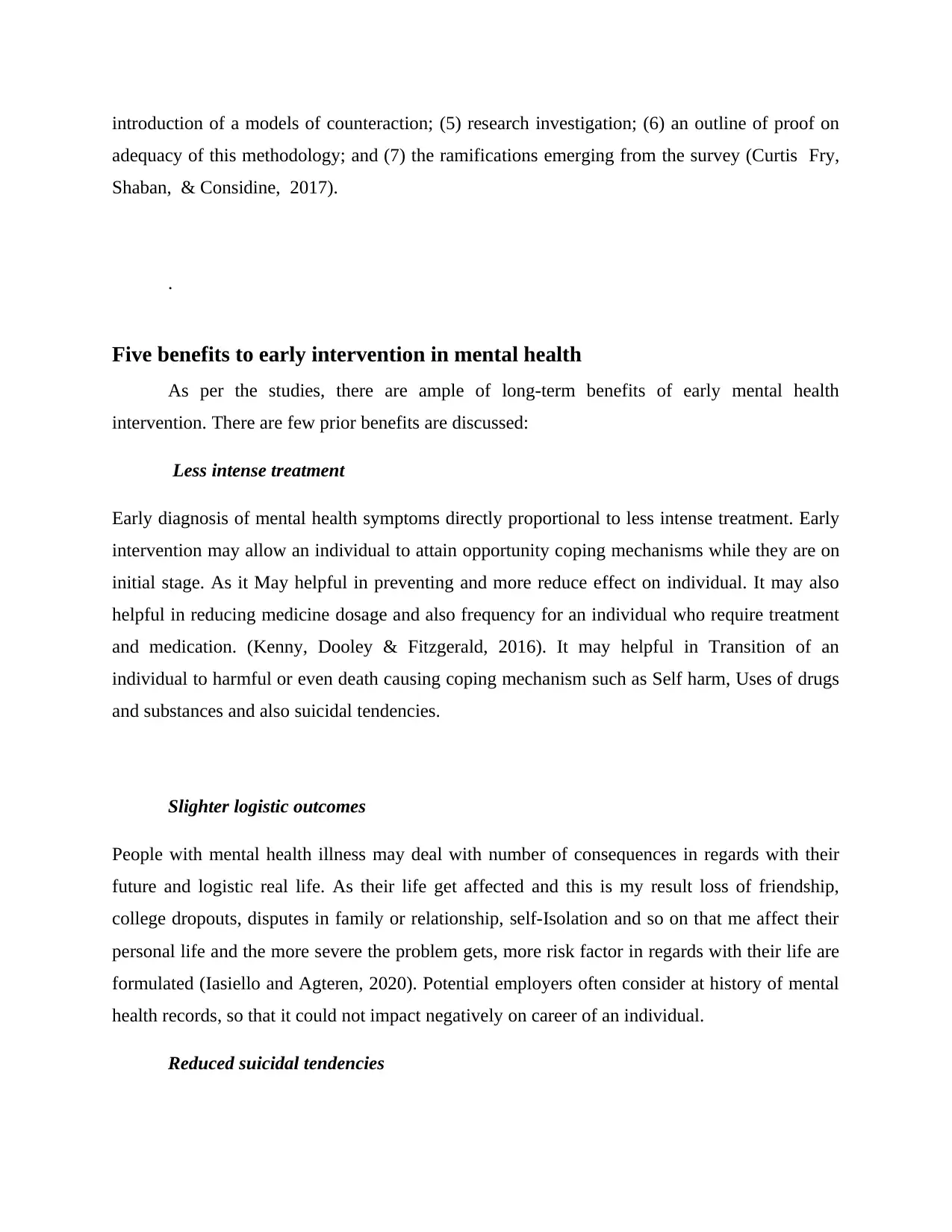
introduction of a models of counteraction; (5) research investigation; (6) an outline of proof on
adequacy of this methodology; and (7) the ramifications emerging from the survey (Curtis Fry,
Shaban, & Considine, 2017).
.
Five benefits to early intervention in mental health
As per the studies, there are ample of long-term benefits of early mental health
intervention. There are few prior benefits are discussed:
Less intense treatment
Early diagnosis of mental health symptoms directly proportional to less intense treatment. Early
intervention may allow an individual to attain opportunity coping mechanisms while they are on
initial stage. As it May helpful in preventing and more reduce effect on individual. It may also
helpful in reducing medicine dosage and also frequency for an individual who require treatment
and medication. (Kenny, Dooley & Fitzgerald, 2016). It may helpful in Transition of an
individual to harmful or even death causing coping mechanism such as Self harm, Uses of drugs
and substances and also suicidal tendencies.
Slighter logistic outcomes
People with mental health illness may deal with number of consequences in regards with their
future and logistic real life. As their life get affected and this is my result loss of friendship,
college dropouts, disputes in family or relationship, self-Isolation and so on that me affect their
personal life and the more severe the problem gets, more risk factor in regards with their life are
formulated (Iasiello and Agteren, 2020). Potential employers often consider at history of mental
health records, so that it could not impact negatively on career of an individual.
Reduced suicidal tendencies
adequacy of this methodology; and (7) the ramifications emerging from the survey (Curtis Fry,
Shaban, & Considine, 2017).
.
Five benefits to early intervention in mental health
As per the studies, there are ample of long-term benefits of early mental health
intervention. There are few prior benefits are discussed:
Less intense treatment
Early diagnosis of mental health symptoms directly proportional to less intense treatment. Early
intervention may allow an individual to attain opportunity coping mechanisms while they are on
initial stage. As it May helpful in preventing and more reduce effect on individual. It may also
helpful in reducing medicine dosage and also frequency for an individual who require treatment
and medication. (Kenny, Dooley & Fitzgerald, 2016). It may helpful in Transition of an
individual to harmful or even death causing coping mechanism such as Self harm, Uses of drugs
and substances and also suicidal tendencies.
Slighter logistic outcomes
People with mental health illness may deal with number of consequences in regards with their
future and logistic real life. As their life get affected and this is my result loss of friendship,
college dropouts, disputes in family or relationship, self-Isolation and so on that me affect their
personal life and the more severe the problem gets, more risk factor in regards with their life are
formulated (Iasiello and Agteren, 2020). Potential employers often consider at history of mental
health records, so that it could not impact negatively on career of an individual.
Reduced suicidal tendencies
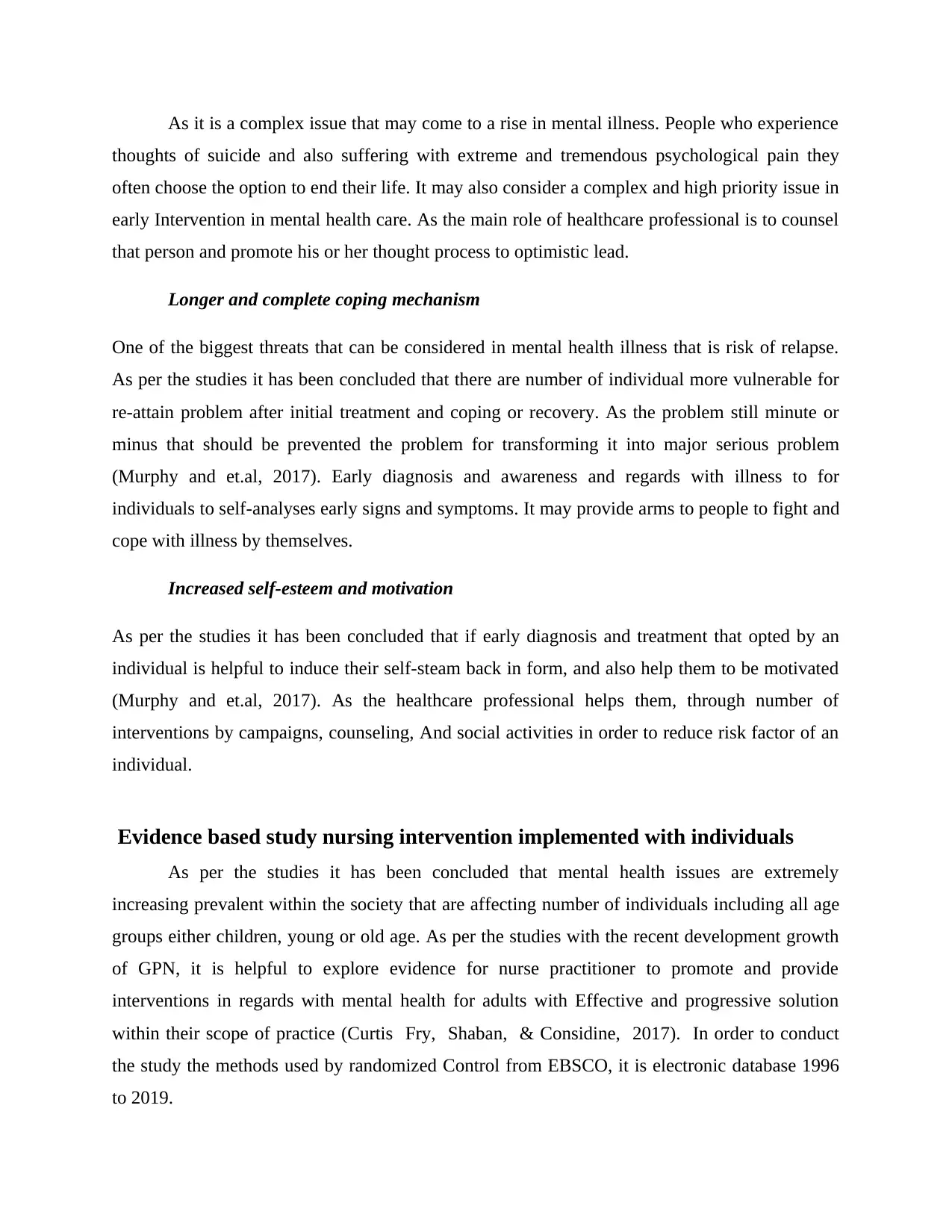
As it is a complex issue that may come to a rise in mental illness. People who experience
thoughts of suicide and also suffering with extreme and tremendous psychological pain they
often choose the option to end their life. It may also consider a complex and high priority issue in
early Intervention in mental health care. As the main role of healthcare professional is to counsel
that person and promote his or her thought process to optimistic lead.
Longer and complete coping mechanism
One of the biggest threats that can be considered in mental health illness that is risk of relapse.
As per the studies it has been concluded that there are number of individual more vulnerable for
re-attain problem after initial treatment and coping or recovery. As the problem still minute or
minus that should be prevented the problem for transforming it into major serious problem
(Murphy and et.al, 2017). Early diagnosis and awareness and regards with illness to for
individuals to self-analyses early signs and symptoms. It may provide arms to people to fight and
cope with illness by themselves.
Increased self-esteem and motivation
As per the studies it has been concluded that if early diagnosis and treatment that opted by an
individual is helpful to induce their self-steam back in form, and also help them to be motivated
(Murphy and et.al, 2017). As the healthcare professional helps them, through number of
interventions by campaigns, counseling, And social activities in order to reduce risk factor of an
individual.
Evidence based study nursing intervention implemented with individuals
As per the studies it has been concluded that mental health issues are extremely
increasing prevalent within the society that are affecting number of individuals including all age
groups either children, young or old age. As per the studies with the recent development growth
of GPN, it is helpful to explore evidence for nurse practitioner to promote and provide
interventions in regards with mental health for adults with Effective and progressive solution
within their scope of practice (Curtis Fry, Shaban, & Considine, 2017). In order to conduct
the study the methods used by randomized Control from EBSCO, it is electronic database 1996
to 2019.
thoughts of suicide and also suffering with extreme and tremendous psychological pain they
often choose the option to end their life. It may also consider a complex and high priority issue in
early Intervention in mental health care. As the main role of healthcare professional is to counsel
that person and promote his or her thought process to optimistic lead.
Longer and complete coping mechanism
One of the biggest threats that can be considered in mental health illness that is risk of relapse.
As per the studies it has been concluded that there are number of individual more vulnerable for
re-attain problem after initial treatment and coping or recovery. As the problem still minute or
minus that should be prevented the problem for transforming it into major serious problem
(Murphy and et.al, 2017). Early diagnosis and awareness and regards with illness to for
individuals to self-analyses early signs and symptoms. It may provide arms to people to fight and
cope with illness by themselves.
Increased self-esteem and motivation
As per the studies it has been concluded that if early diagnosis and treatment that opted by an
individual is helpful to induce their self-steam back in form, and also help them to be motivated
(Murphy and et.al, 2017). As the healthcare professional helps them, through number of
interventions by campaigns, counseling, And social activities in order to reduce risk factor of an
individual.
Evidence based study nursing intervention implemented with individuals
As per the studies it has been concluded that mental health issues are extremely
increasing prevalent within the society that are affecting number of individuals including all age
groups either children, young or old age. As per the studies with the recent development growth
of GPN, it is helpful to explore evidence for nurse practitioner to promote and provide
interventions in regards with mental health for adults with Effective and progressive solution
within their scope of practice (Curtis Fry, Shaban, & Considine, 2017). In order to conduct
the study the methods used by randomized Control from EBSCO, it is electronic database 1996
to 2019.
⊘ This is a preview!⊘
Do you want full access?
Subscribe today to unlock all pages.

Trusted by 1+ million students worldwide
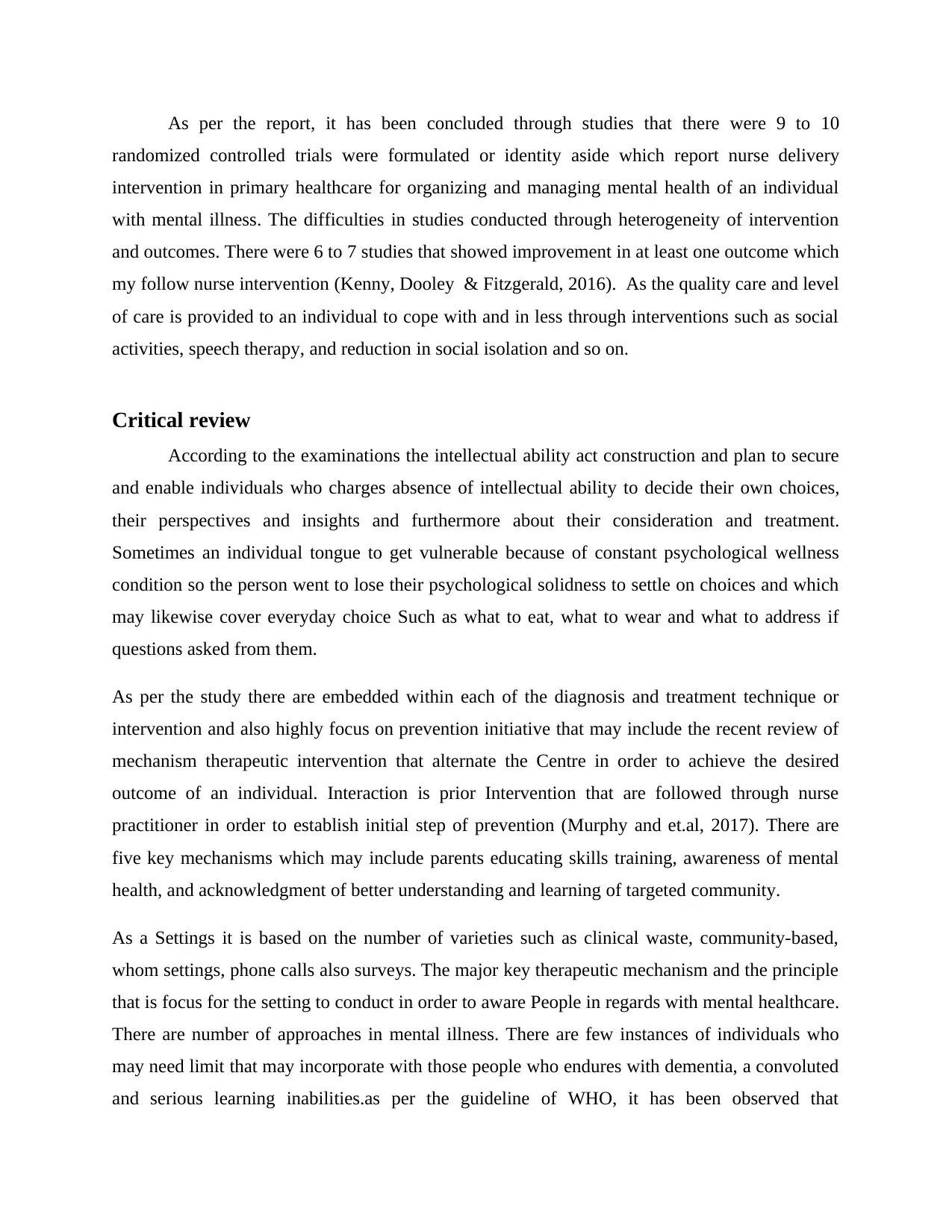
As per the report, it has been concluded through studies that there were 9 to 10
randomized controlled trials were formulated or identity aside which report nurse delivery
intervention in primary healthcare for organizing and managing mental health of an individual
with mental illness. The difficulties in studies conducted through heterogeneity of intervention
and outcomes. There were 6 to 7 studies that showed improvement in at least one outcome which
my follow nurse intervention (Kenny, Dooley & Fitzgerald, 2016). As the quality care and level
of care is provided to an individual to cope with and in less through interventions such as social
activities, speech therapy, and reduction in social isolation and so on.
Critical review
According to the examinations the intellectual ability act construction and plan to secure
and enable individuals who charges absence of intellectual ability to decide their own choices,
their perspectives and insights and furthermore about their consideration and treatment.
Sometimes an individual tongue to get vulnerable because of constant psychological wellness
condition so the person went to lose their psychological solidness to settle on choices and which
may likewise cover everyday choice Such as what to eat, what to wear and what to address if
questions asked from them.
As per the study there are embedded within each of the diagnosis and treatment technique or
intervention and also highly focus on prevention initiative that may include the recent review of
mechanism therapeutic intervention that alternate the Centre in order to achieve the desired
outcome of an individual. Interaction is prior Intervention that are followed through nurse
practitioner in order to establish initial step of prevention (Murphy and et.al, 2017). There are
five key mechanisms which may include parents educating skills training, awareness of mental
health, and acknowledgment of better understanding and learning of targeted community.
As a Settings it is based on the number of varieties such as clinical waste, community-based,
whom settings, phone calls also surveys. The major key therapeutic mechanism and the principle
that is focus for the setting to conduct in order to aware People in regards with mental healthcare.
There are number of approaches in mental illness. There are few instances of individuals who
may need limit that may incorporate with those people who endures with dementia, a convoluted
and serious learning inabilities.as per the guideline of WHO, it has been observed that
randomized controlled trials were formulated or identity aside which report nurse delivery
intervention in primary healthcare for organizing and managing mental health of an individual
with mental illness. The difficulties in studies conducted through heterogeneity of intervention
and outcomes. There were 6 to 7 studies that showed improvement in at least one outcome which
my follow nurse intervention (Kenny, Dooley & Fitzgerald, 2016). As the quality care and level
of care is provided to an individual to cope with and in less through interventions such as social
activities, speech therapy, and reduction in social isolation and so on.
Critical review
According to the examinations the intellectual ability act construction and plan to secure
and enable individuals who charges absence of intellectual ability to decide their own choices,
their perspectives and insights and furthermore about their consideration and treatment.
Sometimes an individual tongue to get vulnerable because of constant psychological wellness
condition so the person went to lose their psychological solidness to settle on choices and which
may likewise cover everyday choice Such as what to eat, what to wear and what to address if
questions asked from them.
As per the study there are embedded within each of the diagnosis and treatment technique or
intervention and also highly focus on prevention initiative that may include the recent review of
mechanism therapeutic intervention that alternate the Centre in order to achieve the desired
outcome of an individual. Interaction is prior Intervention that are followed through nurse
practitioner in order to establish initial step of prevention (Murphy and et.al, 2017). There are
five key mechanisms which may include parents educating skills training, awareness of mental
health, and acknowledgment of better understanding and learning of targeted community.
As a Settings it is based on the number of varieties such as clinical waste, community-based,
whom settings, phone calls also surveys. The major key therapeutic mechanism and the principle
that is focus for the setting to conduct in order to aware People in regards with mental healthcare.
There are number of approaches in mental illness. There are few instances of individuals who
may need limit that may incorporate with those people who endures with dementia, a convoluted
and serious learning inabilities.as per the guideline of WHO, it has been observed that
Paraphrase This Document
Need a fresh take? Get an instant paraphrase of this document with our AI Paraphraser
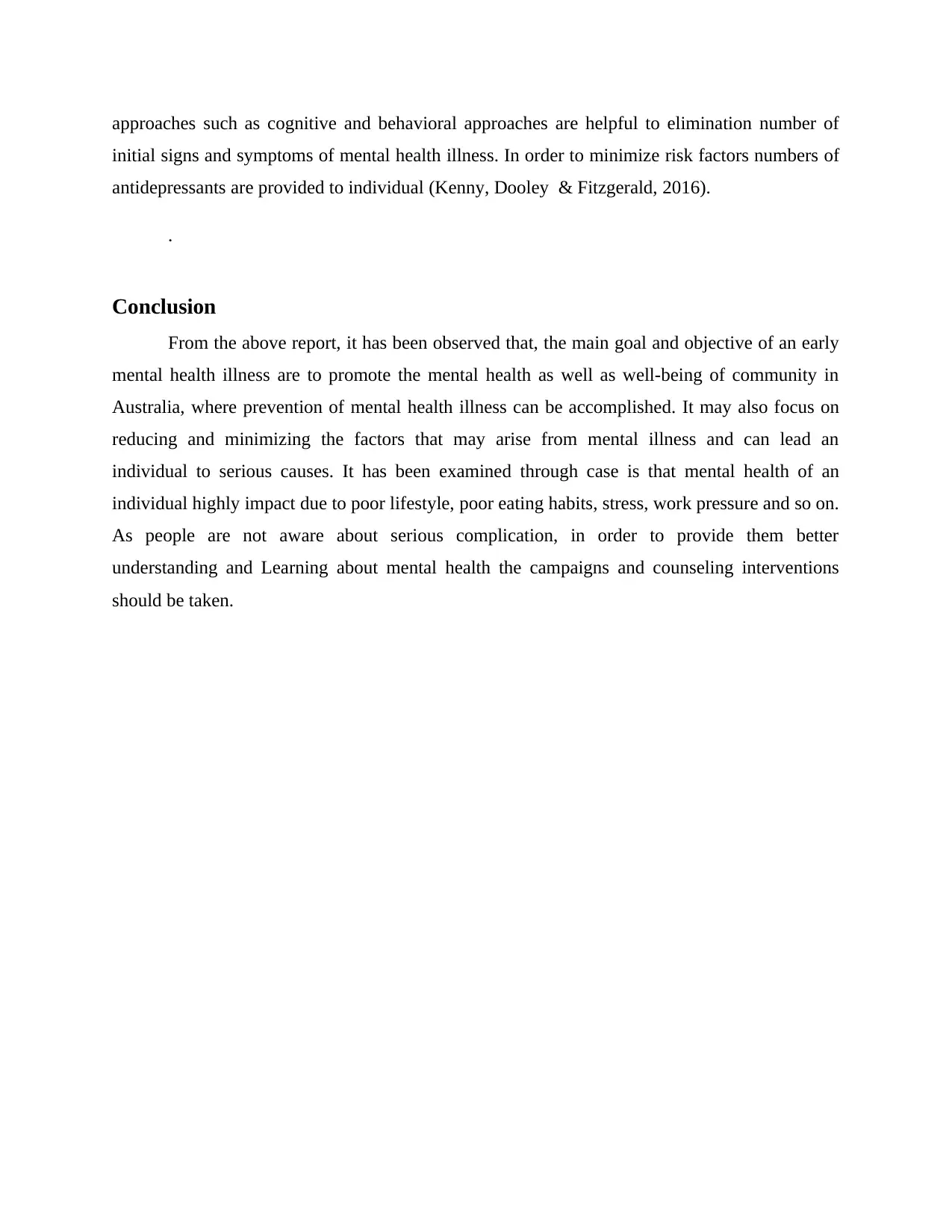
approaches such as cognitive and behavioral approaches are helpful to elimination number of
initial signs and symptoms of mental health illness. In order to minimize risk factors numbers of
antidepressants are provided to individual (Kenny, Dooley & Fitzgerald, 2016).
.
Conclusion
From the above report, it has been observed that, the main goal and objective of an early
mental health illness are to promote the mental health as well as well-being of community in
Australia, where prevention of mental health illness can be accomplished. It may also focus on
reducing and minimizing the factors that may arise from mental illness and can lead an
individual to serious causes. It has been examined through case is that mental health of an
individual highly impact due to poor lifestyle, poor eating habits, stress, work pressure and so on.
As people are not aware about serious complication, in order to provide them better
understanding and Learning about mental health the campaigns and counseling interventions
should be taken.
initial signs and symptoms of mental health illness. In order to minimize risk factors numbers of
antidepressants are provided to individual (Kenny, Dooley & Fitzgerald, 2016).
.
Conclusion
From the above report, it has been observed that, the main goal and objective of an early
mental health illness are to promote the mental health as well as well-being of community in
Australia, where prevention of mental health illness can be accomplished. It may also focus on
reducing and minimizing the factors that may arise from mental illness and can lead an
individual to serious causes. It has been examined through case is that mental health of an
individual highly impact due to poor lifestyle, poor eating habits, stress, work pressure and so on.
As people are not aware about serious complication, in order to provide them better
understanding and Learning about mental health the campaigns and counseling interventions
should be taken.
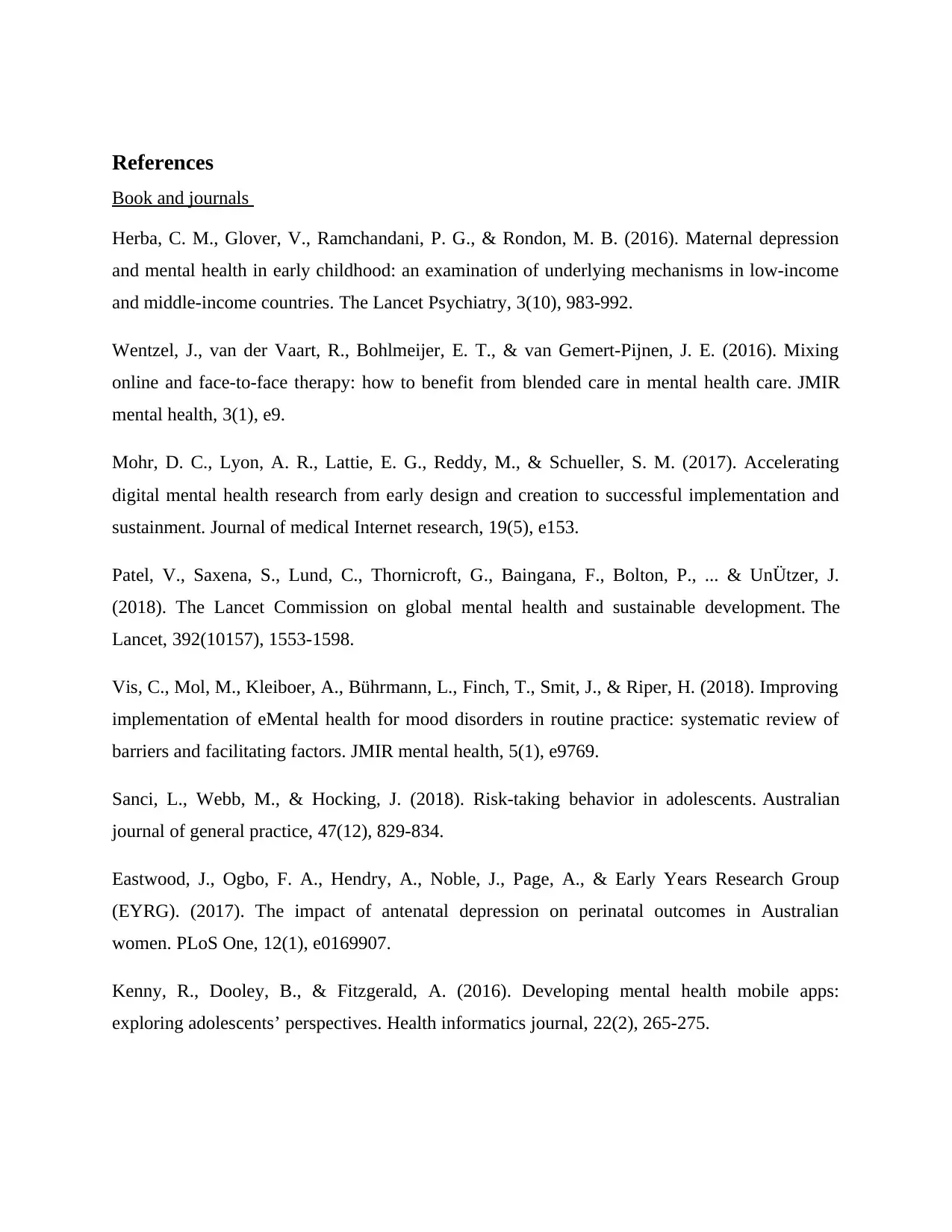
References
Book and journals
Herba, C. M., Glover, V., Ramchandani, P. G., & Rondon, M. B. (2016). Maternal depression
and mental health in early childhood: an examination of underlying mechanisms in low-income
and middle-income countries. The Lancet Psychiatry, 3(10), 983-992.
Wentzel, J., van der Vaart, R., Bohlmeijer, E. T., & van Gemert-Pijnen, J. E. (2016). Mixing
online and face-to-face therapy: how to benefit from blended care in mental health care. JMIR
mental health, 3(1), e9.
Mohr, D. C., Lyon, A. R., Lattie, E. G., Reddy, M., & Schueller, S. M. (2017). Accelerating
digital mental health research from early design and creation to successful implementation and
sustainment. Journal of medical Internet research, 19(5), e153.
Patel, V., Saxena, S., Lund, C., Thornicroft, G., Baingana, F., Bolton, P., ... & UnÜtzer, J.
(2018). The Lancet Commission on global mental health and sustainable development. The
Lancet, 392(10157), 1553-1598.
Vis, C., Mol, M., Kleiboer, A., Bührmann, L., Finch, T., Smit, J., & Riper, H. (2018). Improving
implementation of eMental health for mood disorders in routine practice: systematic review of
barriers and facilitating factors. JMIR mental health, 5(1), e9769.
Sanci, L., Webb, M., & Hocking, J. (2018). Risk-taking behavior in adolescents. Australian
journal of general practice, 47(12), 829-834.
Eastwood, J., Ogbo, F. A., Hendry, A., Noble, J., Page, A., & Early Years Research Group
(EYRG). (2017). The impact of antenatal depression on perinatal outcomes in Australian
women. PLoS One, 12(1), e0169907.
Kenny, R., Dooley, B., & Fitzgerald, A. (2016). Developing mental health mobile apps:
exploring adolescents’ perspectives. Health informatics journal, 22(2), 265-275.
Book and journals
Herba, C. M., Glover, V., Ramchandani, P. G., & Rondon, M. B. (2016). Maternal depression
and mental health in early childhood: an examination of underlying mechanisms in low-income
and middle-income countries. The Lancet Psychiatry, 3(10), 983-992.
Wentzel, J., van der Vaart, R., Bohlmeijer, E. T., & van Gemert-Pijnen, J. E. (2016). Mixing
online and face-to-face therapy: how to benefit from blended care in mental health care. JMIR
mental health, 3(1), e9.
Mohr, D. C., Lyon, A. R., Lattie, E. G., Reddy, M., & Schueller, S. M. (2017). Accelerating
digital mental health research from early design and creation to successful implementation and
sustainment. Journal of medical Internet research, 19(5), e153.
Patel, V., Saxena, S., Lund, C., Thornicroft, G., Baingana, F., Bolton, P., ... & UnÜtzer, J.
(2018). The Lancet Commission on global mental health and sustainable development. The
Lancet, 392(10157), 1553-1598.
Vis, C., Mol, M., Kleiboer, A., Bührmann, L., Finch, T., Smit, J., & Riper, H. (2018). Improving
implementation of eMental health for mood disorders in routine practice: systematic review of
barriers and facilitating factors. JMIR mental health, 5(1), e9769.
Sanci, L., Webb, M., & Hocking, J. (2018). Risk-taking behavior in adolescents. Australian
journal of general practice, 47(12), 829-834.
Eastwood, J., Ogbo, F. A., Hendry, A., Noble, J., Page, A., & Early Years Research Group
(EYRG). (2017). The impact of antenatal depression on perinatal outcomes in Australian
women. PLoS One, 12(1), e0169907.
Kenny, R., Dooley, B., & Fitzgerald, A. (2016). Developing mental health mobile apps:
exploring adolescents’ perspectives. Health informatics journal, 22(2), 265-275.
⊘ This is a preview!⊘
Do you want full access?
Subscribe today to unlock all pages.

Trusted by 1+ million students worldwide
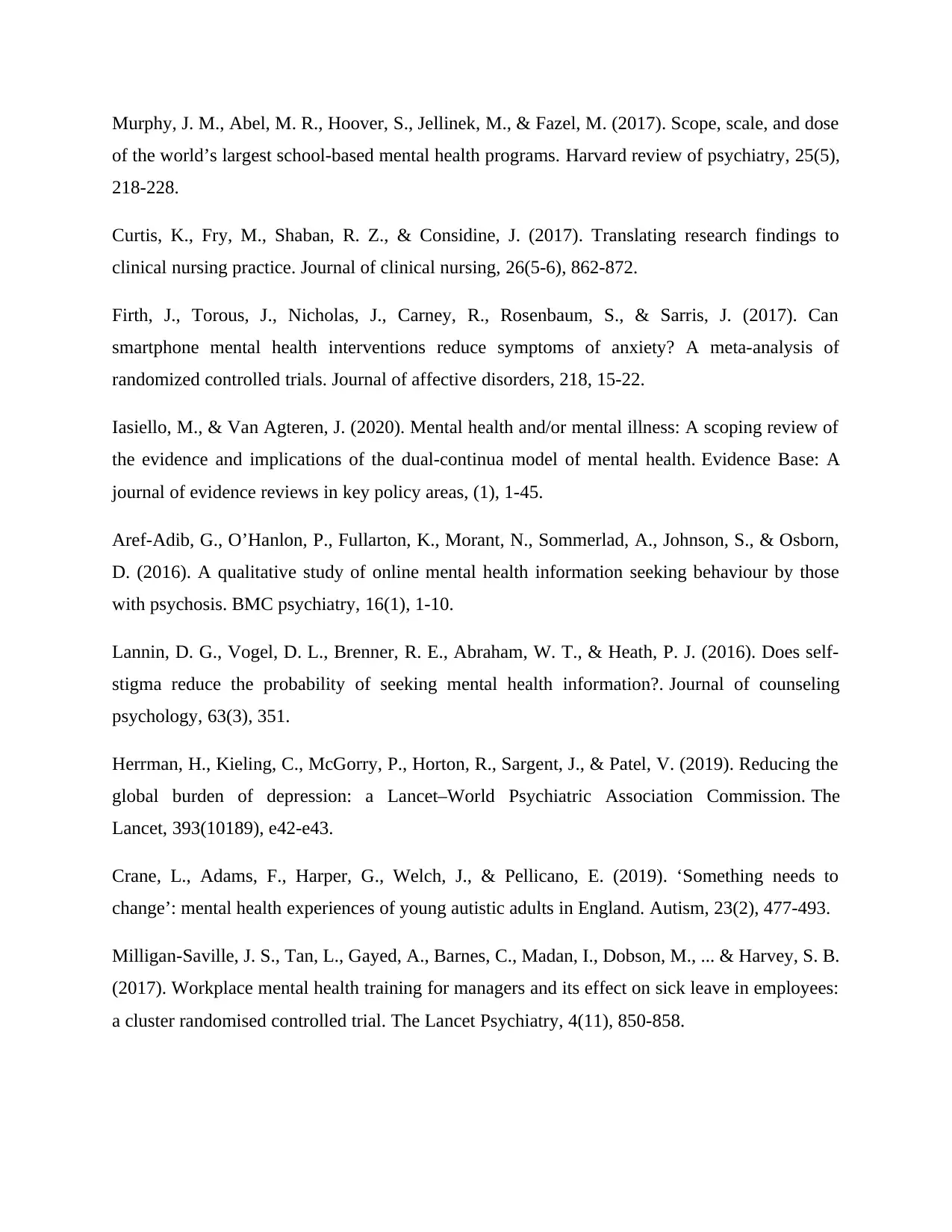
Murphy, J. M., Abel, M. R., Hoover, S., Jellinek, M., & Fazel, M. (2017). Scope, scale, and dose
of the world’s largest school-based mental health programs. Harvard review of psychiatry, 25(5),
218-228.
Curtis, K., Fry, M., Shaban, R. Z., & Considine, J. (2017). Translating research findings to
clinical nursing practice. Journal of clinical nursing, 26(5-6), 862-872.
Firth, J., Torous, J., Nicholas, J., Carney, R., Rosenbaum, S., & Sarris, J. (2017). Can
smartphone mental health interventions reduce symptoms of anxiety? A meta-analysis of
randomized controlled trials. Journal of affective disorders, 218, 15-22.
Iasiello, M., & Van Agteren, J. (2020). Mental health and/or mental illness: A scoping review of
the evidence and implications of the dual-continua model of mental health. Evidence Base: A
journal of evidence reviews in key policy areas, (1), 1-45.
Aref-Adib, G., O’Hanlon, P., Fullarton, K., Morant, N., Sommerlad, A., Johnson, S., & Osborn,
D. (2016). A qualitative study of online mental health information seeking behaviour by those
with psychosis. BMC psychiatry, 16(1), 1-10.
Lannin, D. G., Vogel, D. L., Brenner, R. E., Abraham, W. T., & Heath, P. J. (2016). Does self-
stigma reduce the probability of seeking mental health information?. Journal of counseling
psychology, 63(3), 351.
Herrman, H., Kieling, C., McGorry, P., Horton, R., Sargent, J., & Patel, V. (2019). Reducing the
global burden of depression: a Lancet–World Psychiatric Association Commission. The
Lancet, 393(10189), e42-e43.
Crane, L., Adams, F., Harper, G., Welch, J., & Pellicano, E. (2019). ‘Something needs to
change’: mental health experiences of young autistic adults in England. Autism, 23(2), 477-493.
Milligan-Saville, J. S., Tan, L., Gayed, A., Barnes, C., Madan, I., Dobson, M., ... & Harvey, S. B.
(2017). Workplace mental health training for managers and its effect on sick leave in employees:
a cluster randomised controlled trial. The Lancet Psychiatry, 4(11), 850-858.
of the world’s largest school-based mental health programs. Harvard review of psychiatry, 25(5),
218-228.
Curtis, K., Fry, M., Shaban, R. Z., & Considine, J. (2017). Translating research findings to
clinical nursing practice. Journal of clinical nursing, 26(5-6), 862-872.
Firth, J., Torous, J., Nicholas, J., Carney, R., Rosenbaum, S., & Sarris, J. (2017). Can
smartphone mental health interventions reduce symptoms of anxiety? A meta-analysis of
randomized controlled trials. Journal of affective disorders, 218, 15-22.
Iasiello, M., & Van Agteren, J. (2020). Mental health and/or mental illness: A scoping review of
the evidence and implications of the dual-continua model of mental health. Evidence Base: A
journal of evidence reviews in key policy areas, (1), 1-45.
Aref-Adib, G., O’Hanlon, P., Fullarton, K., Morant, N., Sommerlad, A., Johnson, S., & Osborn,
D. (2016). A qualitative study of online mental health information seeking behaviour by those
with psychosis. BMC psychiatry, 16(1), 1-10.
Lannin, D. G., Vogel, D. L., Brenner, R. E., Abraham, W. T., & Heath, P. J. (2016). Does self-
stigma reduce the probability of seeking mental health information?. Journal of counseling
psychology, 63(3), 351.
Herrman, H., Kieling, C., McGorry, P., Horton, R., Sargent, J., & Patel, V. (2019). Reducing the
global burden of depression: a Lancet–World Psychiatric Association Commission. The
Lancet, 393(10189), e42-e43.
Crane, L., Adams, F., Harper, G., Welch, J., & Pellicano, E. (2019). ‘Something needs to
change’: mental health experiences of young autistic adults in England. Autism, 23(2), 477-493.
Milligan-Saville, J. S., Tan, L., Gayed, A., Barnes, C., Madan, I., Dobson, M., ... & Harvey, S. B.
(2017). Workplace mental health training for managers and its effect on sick leave in employees:
a cluster randomised controlled trial. The Lancet Psychiatry, 4(11), 850-858.
Paraphrase This Document
Need a fresh take? Get an instant paraphrase of this document with our AI Paraphraser
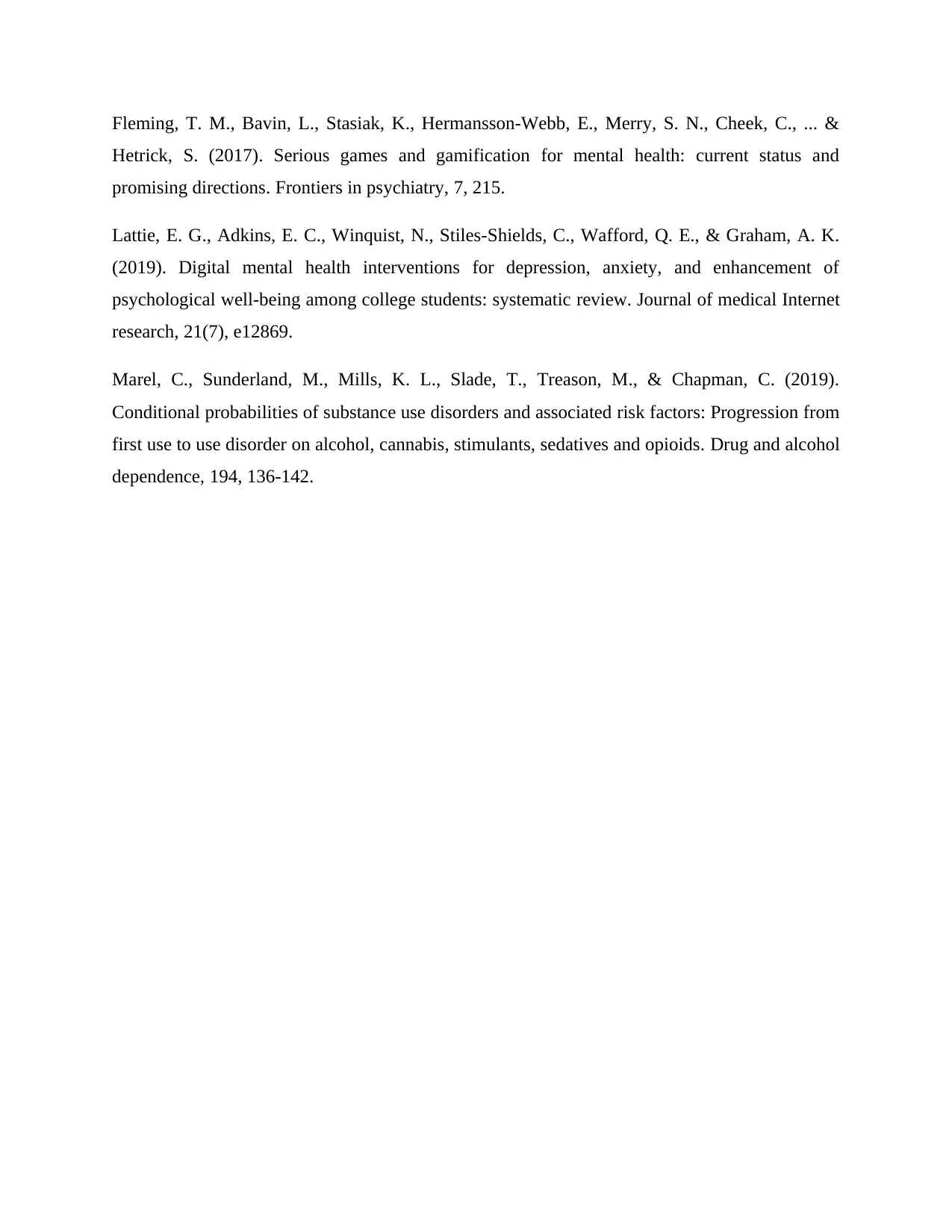
Fleming, T. M., Bavin, L., Stasiak, K., Hermansson-Webb, E., Merry, S. N., Cheek, C., ... &
Hetrick, S. (2017). Serious games and gamification for mental health: current status and
promising directions. Frontiers in psychiatry, 7, 215.
Lattie, E. G., Adkins, E. C., Winquist, N., Stiles-Shields, C., Wafford, Q. E., & Graham, A. K.
(2019). Digital mental health interventions for depression, anxiety, and enhancement of
psychological well-being among college students: systematic review. Journal of medical Internet
research, 21(7), e12869.
Marel, C., Sunderland, M., Mills, K. L., Slade, T., Treason, M., & Chapman, C. (2019).
Conditional probabilities of substance use disorders and associated risk factors: Progression from
first use to use disorder on alcohol, cannabis, stimulants, sedatives and opioids. Drug and alcohol
dependence, 194, 136-142.
Hetrick, S. (2017). Serious games and gamification for mental health: current status and
promising directions. Frontiers in psychiatry, 7, 215.
Lattie, E. G., Adkins, E. C., Winquist, N., Stiles-Shields, C., Wafford, Q. E., & Graham, A. K.
(2019). Digital mental health interventions for depression, anxiety, and enhancement of
psychological well-being among college students: systematic review. Journal of medical Internet
research, 21(7), e12869.
Marel, C., Sunderland, M., Mills, K. L., Slade, T., Treason, M., & Chapman, C. (2019).
Conditional probabilities of substance use disorders and associated risk factors: Progression from
first use to use disorder on alcohol, cannabis, stimulants, sedatives and opioids. Drug and alcohol
dependence, 194, 136-142.
1 out of 11
Related Documents
Your All-in-One AI-Powered Toolkit for Academic Success.
+13062052269
info@desklib.com
Available 24*7 on WhatsApp / Email
![[object Object]](/_next/static/media/star-bottom.7253800d.svg)
Unlock your academic potential
Copyright © 2020–2026 A2Z Services. All Rights Reserved. Developed and managed by ZUCOL.





